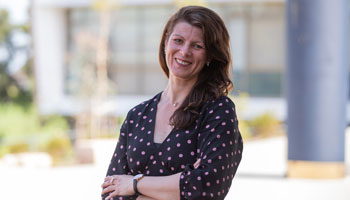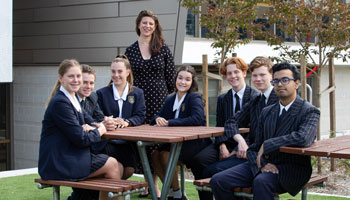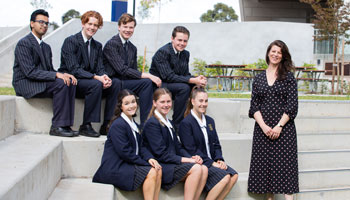With new definitions of Gifted and Talented being rolled out in NSW in 2021, one independent school is already shining a spotlight on its students' potential with great success, writes DEBBIE TARRANT.
To teach and nurture gifted students requires an understanding of who they are and what they need. With the High Potential and Gifted Education (HPGE) Policy operational in NSW public schools in 2021, a new framework will be available for all sectors to develop the talent of high potential and gifted students.
Current research and student achievement data indicate that many students with advanced learning capacity are not reaching their potential. The new policy calls on schools to provide additional support in the form of evidence-based procedures, programs and practices to meet the learning and wellbeing needs, and facilitate talent development, of all high potential and gifted students.

William Clarke College's Debbie Tarrant says a good curriculum is a foundation for supporting high potential learners.
Specifically, the new policy caters to:
- high potential students - those whose potential surpasses that of students of the same age
- gifted students - those whose potential significantly surpasses that of students of the same age
- highly gifted students - those whose potential vastly surpasses that of students of the same age, across four domains of potential – creative, intellectual, socio-emotional, and physical.
Adopting the HPGE Policy as a framework, William Clarke College seeks to assess high potential and gifted students and identify their specific learning needs to inform learning and teaching across all domains of potential: intellectual, creative, social-emotional and physical. This involves using a range of instruments including teacher observations, off-level tests, achievement tests and psychometric tests.

William Clarke College High potential learners were assessed to understand their specific learning needs.
Data-driven decisions to support high potential learners
A mismatch of data collected for some highly gifted students in Year 10 suggested their specific learning needs were not being effectively addressed and they were not on track to “achieve their educational potential” as defined in the policy. Some strikingly simple advice from Carol Ann Tomlinson (regarded by many as the guru of differentiation) that “good curriculum and instruction for gifted learners begins with good curriculum and instruction” provided the impetus to explore a more challenging course for the students to study.
After several months of investigation, research and discussion, the college incorporated the Macquarie University Critical Thinking course into the existing Scholars Elective (a school-developed program for Stage 5). This course is offered by the university as part of its Gifted and Talented Entry Program. The Learning Outcomes (included below) are indicative of the good curriculum it provides.
On successful completion of the Macquarie University Critical Thinking course, students will be able to:
- recognise the structure of arguments and represent that structure in a clear standardised form
- differentiate between the types of reasoning and the methods of evaluation appropriate to each
- appraise the arguments of others and represent them in a clear and standardised form
- construct a well-reasoned argument
- apply the skills of critical analysis to arguments from a variety of contexts and disciplines, including business, law, science, politics, philosophy and the media.

William Clarke College high potential students thrived when provided the opportunity to attend a specialised university course.
From reluctance to reassurance
It is unsurprising that the prospect of studying a university course was met with some angst. Students voiced concerns about the time commitment required to complete a university course and worried that the bar had been raised too high. It was difficult to allay many of these fears as neither staff nor students could access the course content ahead of time, and many hours were spent making important phone calls to Macquarie University and sending reassuring e-mails to parents and students alike. Despite the general feeling of uncertainty, the message remained the same. Students were encouraged to give it a go because they had nothing to lose.
Students developed grit as they came up with scenarios to demonstrate their learning, wrote academic papers, learned to structure an argument, engaged in peer editing and feedback, sharpened their skills in collaborating, and, importantly, honed their time management skills.
It was clear early on that the decision to offer a university course for Year 10 high potential and gifted students was the correct one. After listening to the first lecture, the room was abuzz with student chatter. Students’ faces beamed with delight at their first taste of university. This high level of contentment remained constant until the move to online learning brought on by the global pandemic. Without the immediate support of friends and staff, some students found it difficult to motivate themselves at home. Despite this added challenge, students largely maintained their study regimes, continuing to listen to course lectures and submit assignments.
The Critical Thinking course provided many benefits for the students across the domains of potential including creative, intellectual, and socio-emotional. Students developed grit as they came up with scenarios to demonstrate their learning, wrote academic papers, learned to structure an argument, engaged in peer editing and feedback, sharpened their skills in collaborating, and, importantly, honed their time management skills. Students are very keen to use their new-found knowledge and skills in their other subjects. They also are looking forward to drawing on their learning in other subjects, such as English and History. They are also keen to promote the Critical Thinking course among their peers and visited a Year 9 class to make a presentation and hold a Q and A.

Debbie Tarrant: Evidence-based practices in guiding teaching and learning for high potential learners is the key.
The majority of students outperformed themselves and achieved a Distinction or a High Distinction, in turn qualifying them to undertake a second university course.
The college is proud of the courage and resilience demonstrated by each of the Year 10 students who undertook and completed the 14-week course. The majority of students achieved a Distinction or a High Distinction, in turn qualifying them to undertake a second university course at Macquarie. Students are now partway through this second course. Many are hoping to gain Early Entry to the university and are working hard to make this a reality.
Offering the Critical Thinking course at the college has been illuminating in understanding the needs of high potential and gifted students. Although it is hard to predict what 2021 will bring, William Clarke College will continue to strive for a culture of excellence, using evidence-based practices to ensure that all students have the right opportunities to reach their educational potential.
References
High Potential and Gifted Education (HPGE) Policy
National Association for Gifted Children
Revisiting Gifted Education
New to AISNSW and want to receive AISNSW Education News updates? Click here to register, and select ‘AISNSW Education News’ on the Areas of Interest/Subscriptions page.